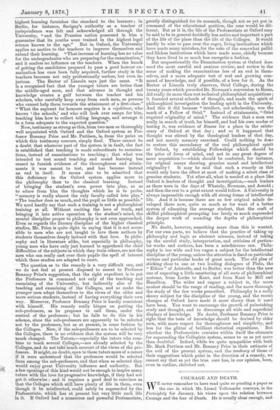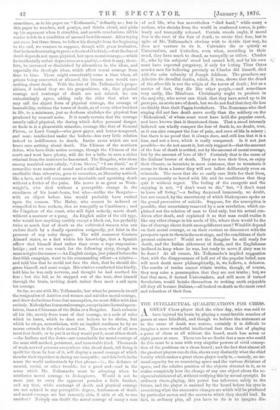COURAGE AND DEATH.
WE never remember to have read quite so puzzling a paper as the one in which Mr. Lionel Tollemache conveys, in the Fortnightly for January, his views upon the relation between Courage and the fear of Death. He is usually clear enough, and sometimes, as in his paper on "Euthanasia," defiantly so ; but in this paper he wanders, and gossips, and thinks aloud, and picks up his argument when it stumbles, and avoids conclusions, till his reader is left in a condition of amused bewilderment. After trying not once, but three times, to follow his thought from the beginning to the end, we venture to suppose, though with great hesitation, that he is.encleavouring to prove a thesis of this kin d, —th at the fear of death depends not upon physical, but upon moral courage,—which he incidentally rather depreciates as a quality,—that it may, there- fere, be increased or diminished by alterations in the ideas, and especially the theologic ideas, which affect moral courage from time to time. There might conceivably come a time when, all priests being converted or silenced, the human race would care nothing about death. With the Brat of Mr. Tollemache's propo- sitions, if indeed they are his propositions, viz., that physical courage and contempt of death are not related, we can unhesitatingly agree, adding only the rider that what we may call the abject form of physical courage, the courage of insensibility, reduces the terror of death, as of every other incident in life, to a minimum, just as deafness abolishes the physical fear produced by unusual noise. It is nearly certain that the courage usually called physical, the daring which defies personal danger, or finds in it a pleasurable stimulus, courage like that of General Picton, or Lord. Gough—who grew gayer, and better-tempered, and more intellectual under the bullets—has very little relation indeed to indifference to death. Entire races which are not brave cave nothing about death. The Chinese of the southern deltas, who have little active courage, though the Chinese of the north and west have plenty, will die for a bribe to save a richer criminal frorathe sentence he has earned. The Bengalee, who alone among mankind says calmly, "Arme bheroo," "I am timid," as if cowardice were matter of moral and social indifference, or rather creditable than otherwise, goes to execution, as Macaulay noticed, like a hero, and will encounter an inevitable and agonising death without a flutter of the pulse. His nerve is as great as Wain- wright's, who died without a perceptible change in the steadiness of his heart-beats, but who—unlike the Bengalee- with an object before him would probably have rushed npon the cannon. The Malay, who cannot be induced or compelled to face rockets, dies as tranquilly as Casabianca ; and the Cingalese of the coast, who will fight nobody, meets death without a murmur or a pang. An English sailor of the old type, who would face anything earthly except a black cat, has probably twice as much fear of death as the cultivated weman who can endure death by a deadly operation resignedly, yet faint in the presence of any noisy danger. The wild romancer Gustave ,Aimard states, as a fact within his knowledge, that a Spanish officer shot himself dead rather than cross a rope auspenaion- bridge ; and we can vouch for the following story, though we mu,stnotgive the names :—An English ensign, just joined before the first Sikh campaign, went to his commanding officer—a relative— and told him that he could not face the shot, that he should dis- grace himself, and must resign. His relative comforted him kindly, told him he was only nervous, and thought he had soothed his fear ; but the lad, as he stepped out of the tent, shot himself through the brain, inviting death rather than meet a call upon his courage.
So far, we are with Mr. Tollemache, but when he proceeds to call the resignation of Asiatics and women and suicides moral courage, and draw deductions from that assumption, we must differ with him entirely. N obody has lesamoral courage, excep t in intellectual specu- lation, than a Chinaman of the Delta or a Bengalee. Each submits all his life, merely from want of that courage, to a code of rules which he hates, which he does not believe to be divine, but which he obeys, nevertheless, with an implicit readiness he by no means extends to the whole moral law. The men who of all men most fear death, or to put it as they would put it, most abhor death —the Italians and the Jews—are remarkable for moral courage of the most stiff-necked, persistent, and immovable kind. Thousands of weak-nerved persons everywhere who dread death, till living is spoilt for them by fear of it, will display a moral courage of which men far their superiors in. daring are incapable ; and this both in the sense the world understands by that phrase—i.e., the defiance of mental, social, or other trouble, for a good end—and in the sense which Mr. Tollemache must be adopting when he attributes moral courage to Robespierre. Would it not be more just to carry the apparent paradox a little further, and say that, while contempt of death and physical courage are not related in any perceptible degree, fearlessness of death and moral courage are but remotely akin, if akin at all, to one another? Nobody can doubt the moral courage of many a man
of evil life, who has nevertheless "died hard," while many a recluse, who shrinks from the world in confessed terror, is pain- lessly and tranquilly released. Certain creeds ought, if moral fear is the root of the fear of death, to create that fear, but in spite of Mr. Tollemache's obvious wish to decide that way, he does not venture to do it. Calvinists die as quietly as Universalists, and Catholics, even when, according to their creed, they have much to dread, as tranquilly as either. Charles IL, who by his subjects' creed had earned hell, and by his own must have expected purgatory, if only for letting Titus Oates murder men, for believing precisely as Charles did himself, died with the calm urbanity of Joseph Addison. The preachers say ,Atheists die dreadful deaths, which, if trues shows that the dread of the after-life is not the origin of the terror of death ; but as a matter of fact, they die like other people,—and sometimes very easily, like Mirabeau. Christianity ought to produce in the majority, who never can think that they have acted up to its precepts, an acute awe of death, but we do not find, that they die less creditably than their Pagan, forefathers. The Norseman who died singing did not face death more coolly than the soldiery on the Birkenhead,' of whom most must have held, the popular creed, and have known that it threatened them. That a creed intensely believed can wholly conquer the fear of death is, no deubt, true, as it can also conquer. the fear of pain, and even of life in misery ; but there is no proof that it always does, and, still less that it is a fear, and not a love, which is really conquered. Is it not just possible—we do not assert it, but only suggest it—that the amount of the fear of death is settled, not by the amount of moral courage, but by the amount of love of life? Certainly that is the cause of the Italians' horror of death. They so love their lives, so enjoy their climate, so luxuriate in mere existence, that to terminate it seems to them a horror they will not inflict ,deliberately even on criminals. The races that die so easily care little for their lives, are permanently so bored with life and its conditions that they quit it without regret. The feeling of the energetic and the enjoying is not, "I don't want to die," but, "I don't want to leave off living,"—a feeling deepened immensely, no doubt, but not caused, by the uncertainty of which Shakespeare spoke as the grand preventive of suiekle. Suppose, for the conception is possible, that uncertainty removed by a new revelation, which ex- plained not the relation of man to God only, but his actual con- dition after death, and explained it so that man could realise it like any other change in his mode of life, where then would be the line of cleavage about death amongdifferent men? Wouldit depend on their moral courage, or on their centent or discontent with the prospects open to themin the nextstage, and the conditions of their present existence ? Would not the Bengalee be still ready for death, and the Italian abhorrent of death, and the Englishman inclined to keep where he was, but ready to move if duty was to be done ? At all events, Mr. Tollemache's implied suggestion that, with the disappearance of hell out of the popular belief, men will meet death more philosophically; is, we believe, a delusion. The results of truths cannot vitiate truths, though, of course, they may raise a presumption that they are not truths ; but, we fear that men, if turned Iliaiversalists, and still more if turned Secularists, would betake themselves to making earth enjoyable till they all became Italians,—all looked on death as. the most cruel and relentless of their foes.



































 Previous page
Previous page